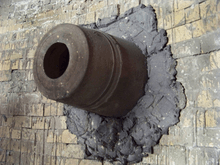tuyere
See also: tuyère
English

A tuyere, seen from inside an empty blast furnace.
Alternative forms
Etymology
From French tuyère, from Middle French tuyere, from Old French toiere (“pipe-hole”), from tuyau, tueil, tudel (“pipe”), from Frankish *thūta (“pipe”), from Proto-Germanic *þeutǭ (“pipe, channel, flow”), from *þeutaną (“to howl, roar, resound”), from Proto-Indo-European *tu-, *tutu- (“bird-cry, shriek”). Cognate with Old Saxon theuta (“pipe, water-channel”), Old High German watardioza (“water-opening”), Old English þēote (“pipe, channel”), Dutch tuit (“spout, nozzle”), Icelandic þjótandi (“the name of an artery”), Icelandic þjóta (“to rush, whistle”).
Pronunciation
- IPA(key): /twiˈjɛɹ/, /twiˈjɪɹ/, /tuˈjɛɹ/
- Hyphenation: tu‧yere
Noun
tuyere (plural tuyeres)
Synonyms
This article is issued from
Wiktionary.
The text is licensed under Creative
Commons - Attribution - Sharealike.
Additional terms may apply for the media files.